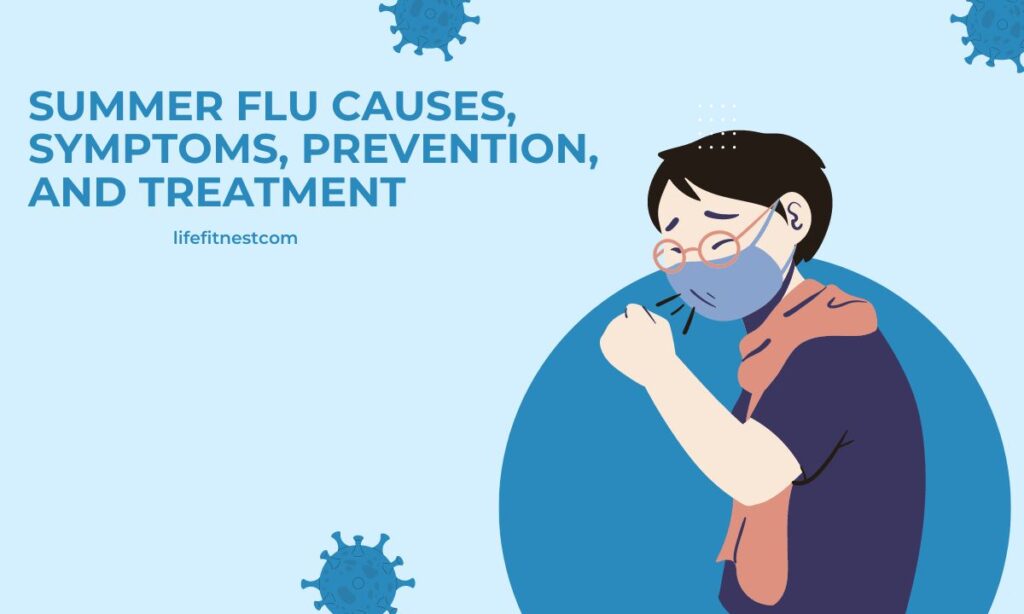Despite its name, summer flu can occur at any time of year and has symptoms similar to a common cold or influenza. Effective management requires understanding its types, causes, treatment options, diagnosis methods, and preventive measures.
While summer flu is less common than in the winter, it can still cause significant health risks and discomfort. This article delves into the complexities of summer flu, providing comprehensive insights for better prevention and management.
Types of Summer Flu
Influenza A: A, the most common strain of summer flu viruses, can cause varying degrees of respiratory illness, ranging from mild to severe. The symptoms include fever, cough, sore throat, body aches, and fatigue.
Enterovirus: infections, including Coxsackievirus and echovirus, can cause various illnesses, including respiratory and gastrointestinal symptoms, and are more common during the summer months.
Respiratory Syncytial Virus (RSV): Although usually associated with winter, infections can occur in the summer, especially in infants and young children. They cause symptoms such as coughing, wheezing, and difficulty breathing.
Influenza B: Similar to Influenza A, Influenza B viruses circulate during the summer and can cause mild to severe respiratory symptoms, as well as fever and fatigue.
Rhinovirus: Commonly associated with the common cold, infections can occur in the summer and cause symptoms such as a runny or stuffy nose, sneezing, sore throat, and cough.
Causes of Summer Flu
Summer flu is primarily caused by the spread of influenza viruses, particularly influenza A and B, as well as other respiratory viruses such as rhinovirus, enterovirus, and respiratory syncytial virus (RSV).
These viruses can spread through respiratory droplets produced by coughing, sneezing, or coming into close contact with infected people.
Furthermore, crowded places, poor ventilation, and weakened immune systems during the warmer months can all contribute to the spread and prevalence of summer flu.
Treatment for Summer Flu
Rest: Make sure you get enough rest to help your body recover from the flu virus and conserve energy for fighting the infection effectively.
Hydration: Stay hydrated by drinking plenty of fluids, such as water, herbal teas, and electrolyte-rich drinks, to promote hydration and help mucus secretions loosen.
Antiviral medications: In some cases, healthcare providers may prescribe antiviral drugs such as oseltamivir (Tamiflu) or zanamivir (Relenza) to alleviate the severity and duration of flu symptoms.
Symptom management: Use cough suppressants, decongestants, and throat lozenges to relieve cough, congestion, and sore throat symptoms.
Diagnosis and Prevention of Summer Flu
Summer flu is typically diagnosed by a healthcare provider after assessing symptoms, conducting a physical examination, and, if necessary, performing laboratory tests such as a nasal swab or throat culture to confirm the presence of influenza or other viral infections. Summer flu prevention measures include getting vaccinated, practicing good hand hygiene, avoiding contact with sick people, maintaining a healthy lifestyle with plenty of rest and nutrition, and following public health guidelines during outbreaks.
Must Read: How Does Caffeine Affect Your Workouts?
Conclusion
Summer flu, while less well-known than its winter counterpart, remains a major public health concern. Individuals can better protect themselves and others from its harmful effects by staying informed about its types, causes, treatment, diagnosis, and preventive measures, regardless of the season.
FAQs
What is summer Flu?
Summer-Flu is a type of respiratory illness caused by influenza viruses or other viral pathogens that are typically associated with the colder months but can also occur during the warmer seasons. The symptoms are similar to those of the winter flu, but the viruses may differ.
Can you get the flu during the summer?
Yes, it is possible to get the flu during the summer because influenza viruses circulate all year. Summer flu is less common than winter flu, but it can still occur, especially in areas with high temperatures and humidity, where viral transmission may persist.
What causes summer flu?
Summer-Flu is caused by the same influenza viruses as during flu season.
What can I do if I have the flu?
If you have the flu, rest and stay hydrated to help your recovery. Use over-the-counter medications to relieve symptoms and consult a doctor if they worsen or persist.


![Understanding Leukemia: A Comprehensive Overview [2024]](https://newstechblog.com/wp-content/uploads/2024/08/cancerHealth-1-1024x536.png)
![Coughing up Phlegm: Causes, Symptoms, and Treatment [2024]](https://newstechblog.com/wp-content/uploads/2024/08/Coughing-up-Phlegm-Causes-Symptoms-and-Treatment-1024x614.jpg)